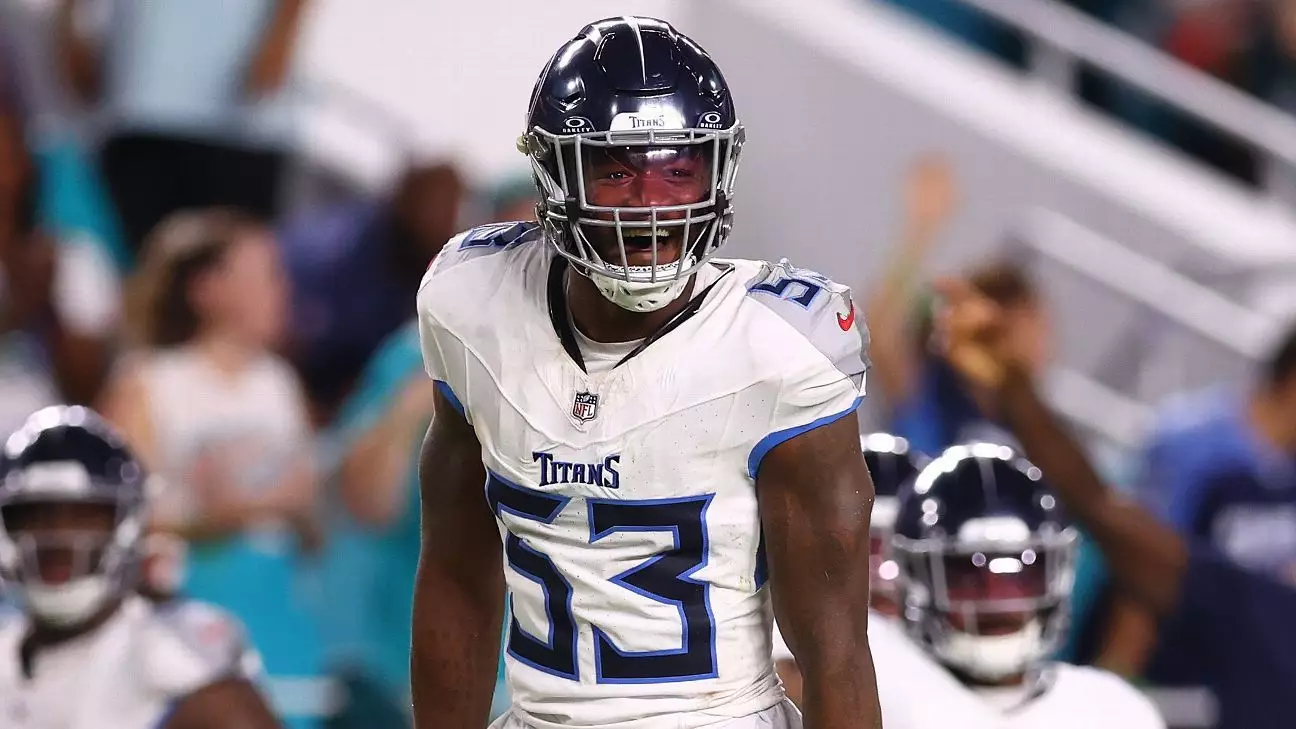The recent trade agreement between the Seattle Seahawks and Tennessee Titans marks a significant shift in the dynamics for both teams, specifically in the inside linebacker position, which many analysts view as a critical aspect of defensive play. This acquisition not only reflects strategic moves responding to immediate team needs but also signifies an evolving landscape of player management and negotiation tactics within the NFL.
On Wednesday, the Seahawks finalized a deal to acquire Ernest Jones IV from the Titans, parting with Jerome Baker and a fourth-round pick for the 2025 draft. This transaction underscores the weaknesses in Seattle’s current lineup, as they aim to fortify their defense in a competitive NFC West division. The Seahawks, boasting a 4-3 record, are looking to solidify their playoff position while reflecting on their defensive strategies and the need to improve in areas where they have struggled.
Ernest Jones, who notably emerged as a promising talent during his tenure with the Los Angeles Rams, has transitioned from team to team in search of a starting role that reflects his potential. His performance this season, with 44 tackles underscoring his ability to contribute effectively, may provide the Seahawks with the support they need, especially given their current vulnerability against the run, with defensive statistics showing they have allowed over 146 rushing yards per game.
For the Titans, moving on from Jones could raise eyebrows given their 1-5 record and the struggles they face in establishing a cohesive defensive unit. Jones had quickly gained a starting position and was placing his stamp on the team’s defense. His leadership on the field and intricate understanding of the defensive schemes made him a valuable asset despite the team’s overall challenges. However, the dual trade-day maneuvers suggest a broader strategic reassessment as they prepare for a potential rebuild or recalibration.
The influential trade of star receiver DeAndre Hopkins to the Kansas City Chiefs amplifies this perspective. By offloading key players, the Titans appear focused on developing a younger and potentially more dynamic roster. This type of strategy often reflects a long-term vision, particularly when a team is in dire need of both talent and financial flexibility.
While it is tempting to view the trade through the lenses of the players directly involved, the implications stretch further into the framework of both organizations. The Seahawks, seeking to extend Jones beyond his rookie contract that will conclude after the 2024 season, introduce the question of risk versus reward in extending trades. Historical trends in the NFL show that teams often hesitate to extend new acquisitions prematurely, preferring to assess player fit and performance first.
Contrastingly, Baker’s movement to the Titans could yield fruitful outcomes for both him and the team. Ironically, Baker’s trajectory at Seattle was hampered by injuries and inconsistent play, making his transfer to another organization an opportunity for renewal. As both Jones and Baker adapt to new systems, recovery, and boost their respective performances, the shifting fortunes of these players offer an intriguing subplot to the ongoing NFL narrative.
Ultimately, trades such as these reflective of a larger trend within the NFL where teams strategically navigate player movements, contract negotiations, and roster management to secure a competitive edge. The Seahawks are utilizing Jones’ familiarity with a scheme that mirrors their own to enhance their defensive output, while the Titans are prioritizing youth and depth as they build toward the future.
As we observe more trades and roster shifts, the football world must pay close attention to how teams are reshaping their identities in pursuit of success. Whether through trades, drafts, or player development, the evolving nature of the NFL significantly reshapes team dynamics and challenges established hierarchies within the league. The outcomes from these trades may set the trajectory for both franchises as they seek to reclaim or maintain their competitive relevance in an unpredictable season.


Leave a Reply